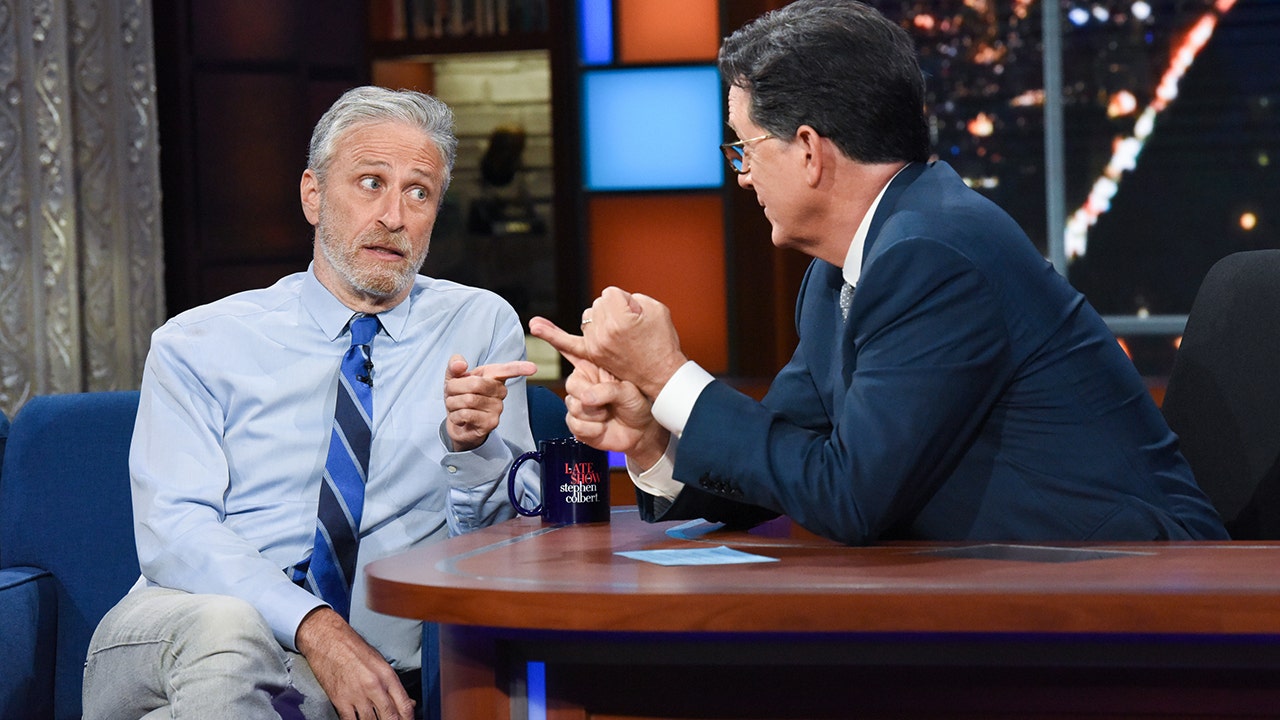In a blistering segment on Monday’s episode of The Daily Show, Jon Stewart unleashed a no-holds-barred critique of CBS and its parent company, Paramount Global, following the abrupt cancellation of The Late Show with Stephen Colbert. The veteran comedian, known for his incisive commentary, accused the network of buckling under political pressure from former President Donald Trump, sparking a firestorm of debate about corporate influence, free speech, and the future of late-night television. The episode, aired uncensored on Comedy Central, has galvanized viewers and industry insiders alike, highlighting the tensions roiling American media in 2025.
Stewart, 62, took aim at CBS’s decision to end Colbert’s show, which the network claimed was a purely financial move, unrelated to the program’s content or performance. The official statement from CBS insisted the cancellation was not tied to external pressures or Paramount’s broader corporate maneuvers, but Stewart dismissed this as disingenuous. Pointing to Paramount’s recent $16 million legal settlement with Trump and its pending $8 billion merger with Skydance Media, he suggested the decision reeked of political appeasement. “Shows that say something, shows that take a stand, shows that are unafraid—this is not a ‘We speak truth to power.’ We don’t,” Stewart said, his voice rising with conviction. “We speak opinions to television cameras. But we try. We f— try, every night.”

The segment, laced with profanity allowed by Comedy Central’s looser cable regulations, culminated in a rousing church choir performance urging institutions to “sack the f— up” or “go f— yourself.” Stewart’s raw passion struck a chord, with social media erupting in support. Fans on X posted clips of the choir, with one user writing, “Jon Stewart just spoke for everyone who’s fed up with corporate cowardice!” Others created memes juxtaposing Stewart’s fiery delivery with images of crumbling network logos, captioned “Late Night Fights Back.”
The cancellation of The Late Show, a ratings juggernaut since Colbert took over from David Letterman in 2015, has sent shockwaves through the industry. Colbert, 61, responded on his own show shortly after Stewart’s rant, echoing his mentor’s outrage. In a rare expletive-filled retort, he called Paramount’s settlement with Trump a “big fat bribe” and declared, “They left me alive. And now for the next 10 months, the gloves are off.” His episode featured a morale-boosting musical performance with “Weird Al” Yankovic and Lin-Manuel Miranda, alongside cameos from fellow late-night hosts, signaling defiance in the face of adversity.
Trump, meanwhile, reveled in the cancellation, taking to Truth Social to gloat. “It’s really good to see them go, and I hope I played a major part in it!” he wrote, dismissing Colbert, Jimmy Kimmel, and Jimmy Fallon as “people with absolutely NO TALENT” who “destroyed what used to be GREAT Television.” His comments fueled speculation that political pressure influenced CBS’s decision, especially given the timing of Paramount’s settlement over a 2024 60 Minutes interview with Kamala Harris, which Trump had sued over, claiming defamation. Legal experts largely viewed the lawsuit as baseless, but Paramount chair Shari Redstone reportedly pushed for the settlement to ease regulatory hurdles for the Skydance merger.

The merger, valued at $8 billion and awaiting government approval, has intensified scrutiny of Paramount’s motives. Skydance CEO David Ellison, son of Trump ally Larry Ellison, has promised to incorporate “diverse viewpoints” into the media conglomerate, which includes CBS News, Comedy Central, and Nickelodeon. Trump’s public endorsement of the deal has raised eyebrows, with critics arguing it compromises editorial independence. The settlement has already prompted resignations at CBS, including 60 Minutes correspondent Scott Pelley and news executives Bill Owens and Wendy McMahon, who cited concerns over the network’s integrity.
Stewart, who shares a storied history with Colbert from their days on The Daily Show and The Colbert Report, praised his friend’s legacy, noting that The Late Show was the top-rated late-night program on network television. He framed the cancellation as part of a broader decline in the industry, likening late-night TV to “a Blockbuster kiosk inside of a Tower Records.” Yet, he rejected the idea of abandoning the format. “When CDs stopped selling, they didn’t just go, ‘Oh, well, music, it’s been a good run,’” he quipped, urging networks to fight for relevance rather than caving to external pressures.

The public reaction has been electric. Fans flooded social media with hashtags like #SaveLateNight and #StewartVsCBS, while industry insiders expressed alarm. One X user wrote, “Stewart calling out CBS is the gut punch we needed. This isn’t just about Colbert—it’s about what media stands for.” Another commented, “Paramount folding to Trump sets a dangerous precedent. Stewart’s right: grow a spine or get out.” Some viewers launched petitions to reinstate The Late Show, while others speculated about Colbert moving to a streaming platform or cable network.
The controversy underscores the precarious state of late-night television, caught between declining ad revenue and political crosshairs. Stewart’s and Colbert’s defiance has rallied supporters who see their shows as vital spaces for satire and social commentary. “If you believe you can make yourself so innocuous that you’ll never be on the boy king’s radar—why will anyone watch you?” Stewart asked, challenging networks to prioritize substance over safety. His vow to keep fighting—“I’m not giving in. I’m not going anywhere—I think”—resonated as a call to arms for an industry at a crossroads.
As the Paramount-Skydance merger looms and Trump’s influence lingers, the cancellation of The Late Show has become a flashpoint in the battle for media independence. Neither Paramount nor Comedy Central has responded to the uproar, leaving Stewart’s words to echo in the void. For now, the outcry from fans and hosts alike signals a refusal to let late-night’s legacy fade quietly. With Stewart and Colbert leading the charge, the fight for fearless television is far from over.


